
What Capitalism Needs - Forgotten Lessons of Great Economists
| Verlag | Cambridge University Press |
| Auflage | 2021 |
| Seiten | 312 |
| Format | 14,6 x 22,2 x 2,2 cm |
| Gewicht | 510 g |
| Artikeltyp | Englisches Buch |
| EAN | 9781108487825 |
| Bestell-Nr | 10848782UA |
There is no inevitable logic of capitalism. Capitalism's stability depends on how well nation-states manage it and on social cohesion.
From unemployment to Brexit to climate change, capitalism is in trouble and ill-prepared to cope with the challenges of the coming decades. How did we get here? While contemporary economists and policymakers tend to ignore the political and social dimensions of capitalism, some of the great economists of the past - Adam Smith, Friedrich List, John Maynard Keynes, Joseph Schumpeter, Karl Polanyi and Albert Hirschman - did not make the same mistake. Leveraging their insights, sociologists John L. Campbell and John A. Hall trace the historical development of capitalism as a social, political, and economic system throughout the twentieth and early twenty-first centuries. They draw comparisons across eras and around the globe to show that there is no inevitable logic of capitalism. Rather, capitalism's performance depends on the strength of nation-states, the social cohesion of capitalist societies, and the stability of the international system - three things that are in short supply t oday.
Inhaltsverzeichnis:
1. Sociology from economics; 2. Phoenix from the ashes; 3. Storm clouds; 4. Nationalism and social cohesion; 5. State failure; 6. What next?
Rezension:
'This superb book reminds us of one enduring insight. Economists like Smith, Hirschman, List, Keynes, Schumpeter, and Polanyi understood what modern economics has forgotten. Capitalism does not flourish when markets are fully free. It thrives when they are socially embedded and politically well governed. A turbulent twentieth century has made this pandemic moment ripe for this timeless reminder.' Peter J. Katzenstein, Cornell University
